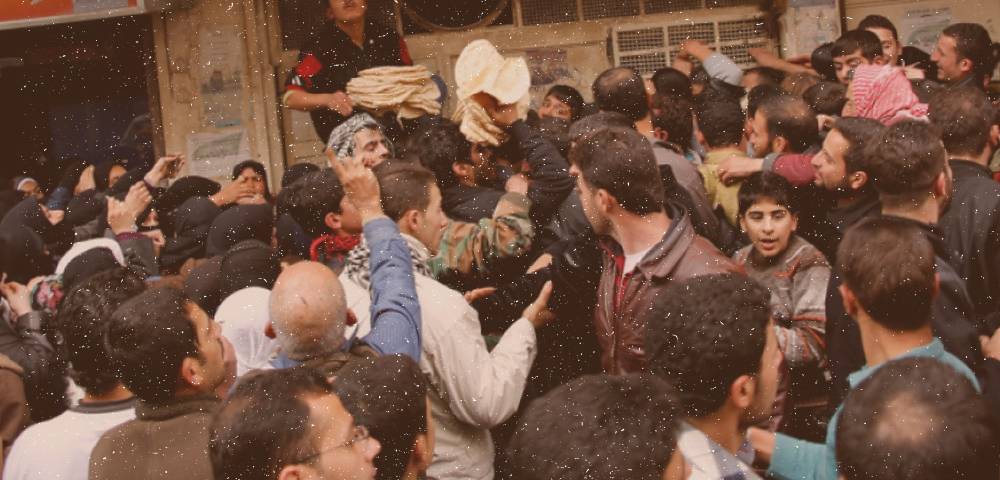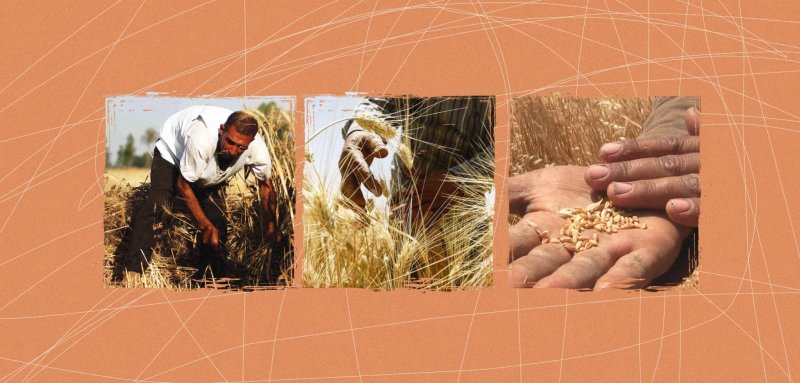“Next year will be the year of wheat, in terms of its farming and production.” This is what the Syrian Minister of Agriculture and Agrarian Reform, Muhammad Hassan Qatna, pledged only last year, at the end of 2020. He had urged farmers to plant the largest possible area with wheat, due to the massive shortage that Syria has been suffering from in recent years, which has turned it from one of the major wheat-exporting countries to a country teeming with long queues of bread, and the ruling authorities within different areas of control regulating the portions of each citizen.
Pictures of the bread lines in Syria have become a regular sight commented on and featured in newsreels over the past years. The World Food Program said in March that 12.4 million Syrians - more than 60% of the country’s population - suffer from food insecurity and hunger, double the number recorded in 2018.
But the effects of the war, and the sharing of control over agricultural land between the de facto authorities and the Syrian government, in addition to the drought that has been devastating the country for years and the high costs of production, as well as Turkey’s control over the waters of the Euphrates River flowing into Syria, have all contributed to obstructing the plans for Syria’s “year of wheat”. The production of wheat this year declined from that of the previous year by nearly 200 thousand tons, according to statements made by the head of the Agricultural Affairs Office of the General Union of Peasants in Syria (GUP), Mohammad al-Khalif.
Despite the high proportion of wheat crops this season, output dropped due to droughts, diverting Euphrates River waters, the severe fuel shortages, and the failure to secure sufficient fertilizer.
“Nothing Like We Expected”
The Syrian government said through its officials at the end of last year that it aims to produce around one million tons of wheat during the year of 2021, on top of the production of 2020, which reached about 600 thousand tons. As of June, production had reached 237 thousand tons, according to the head of the General Union of Peasants (GUP), Ahmed Saleh. He projected the rate to reach somewhere between 350 and 400 thousand tons by the end of 2021, equivalent to less than a quarter of the needs of the regime-controlled areas.
In a report prepared by Russia Today on the wheat situation in Syria, the director of the General Establishment for Cereal Processing and Trade, Youssef Qassem, attributed the decline in wheat production - despite having a wider expanse of wheat-planted land during the current season - to “the lack of rain, the closing of the Euphrates River, the severe fuel shortages in Syria, and the failure to secure sufficient fertilizers.”
While the head of the Agricultural Affairs Office, Mohammad al-Khalif, attributed the reasons for this decline in wheat quantities - especially in al-Hasakah Governorate in northeast Syria - to members of the Syrian Democratic Forces (SDF) “preventing farmers from delivering their production to the government’s grain-receiving facilities.” He added, during his interview with the pro-Syrian regime Al-Watan local newspaper, that “there is no alternative to importing” because Syria’s (regime-controlled areas) annual need exceeds one million tons.
Wheat War
Many farmers headed to the Autonomous Administration ‘sales centers’ of the province of al-Hasakah and the regions of northeastern Syria to sell their crops. These Autonomous Administration institutions have set the price of 1,150 Syrian pounds per kilogram of wheat, while the Syrian government has only set an amount of 900 Syrian pounds.
The co-chair of the Agriculture and Economy Authority in the Autonomous Administration, Suleiman Barudo, said in press statements that the autonomous administration (the Autonomous Administration of North and East Syria - AANES) will depend on irrigated crops after the rain-fed crops were significantly damaged as a result of the drought. He expected production in northeastern Syria to range somewhere between 500 and 600 thousand tons.
Competing authorities tried to purchase wheat from farmers, while Bashar al-Assad’s forces resorted to raiding the homes and warehouses of farmers, arresting them and confiscating crops.
As for the opposition’s self-styled “interim government” of the National Coalition for Syrian Revolutionary and Opposition Forces (SNC), according to press reports, it has set the price in US dollars within its areas of control in northwestern Syria. The price was set at a rate of $300 per ton (one thousand kilograms) of wheat, making the price of one kilogram there less than in the other regions when converted to the Syrian pound, according to official rates.

The Ministry of Finance and Economy of the “interim government” also announced last July that the total quantity of wheat purchased from farmers for this season had reached 8,630 tons as of that date. It predicted that the quantity expected to be purchased in the areas under its control would reach 20,000 tons before the end of this year.
In an attempt to entice farmers to sell their wheat harvest to their government centers, the Syrian government (of Bashar al-Assad) issued a decision to give one hundred Syrian pounds (0.03 US dollars) as a reward for every kilogram of wheat that a farmer sells to government institutions. In other words, a reward of about $28 per every ton (1,000 kilos) of wheat.
In other areas under the control of regime forces, the regime relied on a policy of intimidation, with joint security patrols carrying out raids on the homes of farmers during the months of June and July, especially in the areas of Al-Safirah, Tall al-Daman, Dayr Hafir and Al-Khafsah. They confiscated large quantities of wheat stored in the warehouses and homes of farmers, as well as arresting some of the farmers.
Government-affiliated committees also arrested a number of merchants and traders after confiscating some quantities of wheat, which, according to press reports, caused panic among farmers within those areas. As a result, a large portion of them delivered their entire crop harvest to the regime’s grain centers, while others opted to take safer storage procedures.
It is worth noting that Syria is divided into three main areas of influence, the first and largest of which is the area controlled by the regime of Bashar al-Assad. This portion alone needs about two million tons of wheat annually to secure its need for bread, in addition to 360 thousand tons of seeds, and about 800,000 tons for other uses, adding up to more than three million tons in total, according to statistics by the Ministry of Agriculture.
As for the areas under the control of the Autonomous Administration and the Syrian Democratic Forces (SDF) in northeastern Syria, they require around 600 thousand tons of bread flour and seeds for next year. Similarly, nearly the same amount is needed in the areas of northwestern Syria that are under the control of Hay’at Tahrir al-Sham, the Syrian National Army and the opposition’s interim government of the Syrian National Coalition (SNC).
Raseef22 is a not for profit entity. Our focus is on quality journalism. Every contribution to the NasRaseef membership goes directly towards journalism production. We stand independent, not accepting corporate sponsorships, sponsored content or political funding.
Support our mission to keep Raseef22 available to all readers by clicking here!
Interested in writing with us? Check our pitch process here!



